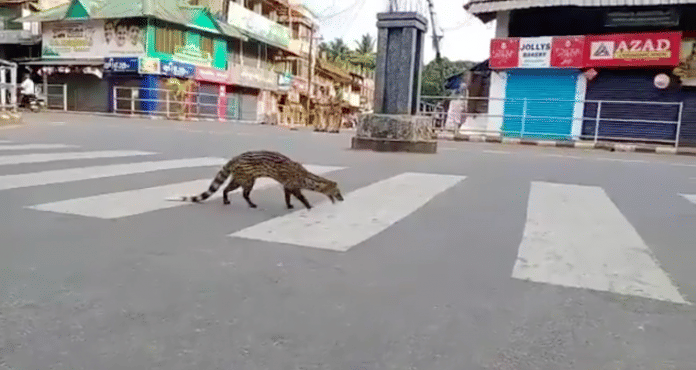It took 10 days into India’s lockdown for the wildlife to reclaim public spaces again. In Uttarakhand, three Sambar deer were spotted walking on the streets, while a nilgai was found strolling in Noida. An elephant was captured in Uttarakhand’s Dehradun, a Small Indian civet was seen in Kerala’s Kozhikode, Olive Ridley Turtles came ashore a beach in Odisha, a bison passed through a marketplace in Karnataka, peacocks danced on the streets in Mumbai, and a leopard reached close to an Air Force base near Patna in Bihar.
As soon as humans emptied the streets, animals took over. And not just in India. From the US to France, Italy to Japan, Poland to England, animals have truly come out of the wild. It is a lesson in human-wildlife conflict that tells us how we have occupied their spaces — and how animals reclaim them the first chance they get. For instance, the abandoned city of Pripyat in Northern Ukraine, the site of the Chernobyl nuclear power plant. More than 30 years after the nuclear disaster, the place is now inhabited by more than 200 bird species and other animals, including in the exclusion zone that humans had created after the explosion. Perhaps it’s the nature’s way to bring balance in biodiversity and give back to other species what we have forcibly taken from them.
The ‘real’ intruders
The animals being spotted on the Indian streets are not running around aggressively, damaging public property or causing harm to anyone — traits that humans have been quick to point out to justify the need to demarcate these spaces and term the wild animals as ‘intruders’.
But with us deciding to stay at home due to the threat of coronavirus, the peaceful reclamation of public spaces by animals shows who the real intruders are. While embracing an aggressive, ‘development-driven’ lifestyle, we have altered the natural surroundings, keeping our needs and desires as the reference points. So we like animals as food or when they are kept in a zoo but press the panic button as soon as some monkeys land on our rooftops or a rhino shows up at some human settlement.
But India isn’t the only country under lockdown. And that’s why animals world over are rejoicing the newfound freedom and extra space to move around. Several videos of wild animals strolling around the city streets have surfaced on social media. Wild turkeys took their spot at a school playground in California, US; a coyote was spotted on the streets of San Francisco; deer were seen in a town in Poland; wild pigs reached the streets of Paris, France; and wild boars travelled to the roads of Barcelona, Spain.
The message is clear: animals are loving the quiet and a world free of human presence.
Also read: India to Hungary, Covid-19 will make frightened people trade freedom for life
Rethink interaction with wildlife
The coronavirus lockdown is a lesson for humans to rethink their relationship with the nature. Researchers have shown how humans are inviting new diseases upon themselves by expanding into the wilderness and closing the gap with other species. A study found that “some 60 per cent of the new diseases that crop up around the globe each year are zoonotic — meaning they come from domesticated animals or wildlife.” The Covid-19 is also a zoonotic disease, with the virus purportedly coming from the wet markets of Wuhan, China, primarily because the Chinese have never really regulated their illegal black markets for live animal trading. Perhaps that’s why the markets in Wuhan have reopened after a two-month lockdown. Animals are being butchered and sold again.
Under such circumstances, can humans blame the animals? It is ironic that to fight a virus that came from the animals, humans are looking for a vaccine again with the help of animals. The Chinese government has prescribed using ‘Tan Re Quing’ — an injection containing bear bile — for the treatment of Covid-19. China’s hunt for a vaccine will eventually hurt India’s wildlife species in the northeast region. Clearly, humans haven’t learnt the lessons yet.
It remains to be seen how things are going to change once the lockdown is over. We will get back to our daily routines. The roads will be flocked by thousands of vehicles, and the animals would be forced to retreat to the wild and their sanctuaries and zoos. There is a possibility human-animal conflicts might increase if they get used to a human-free environment. But if the coronavirus lockdown has told us anything, it’s this: the human-wildlife interaction needs to change. We need to be more inclusive, make laws keeping in mind the ecological aspect or at least not interfere with the nature’s way of functioning. We might claim to be missing the nature, the nature surely isn’t missing us.
Views are personal.







very nice…. it helped me alott..thanks
Thanks for this article. One small correction, the elephant video was from Nov 2019, as mentioned on the tweet.
Your article subtly advocates lockdown. Not just reclaim by animals, pollution has hugely reduced, road accidents and related deaths have been unheard of, many other contagious diseases have stopped spreading. So let’s continue with this lockdown, why loose such a huge gain.
I guess I are an illiterate fool soo u see this as an gain inspire of the immense financial loses people and government are incurring